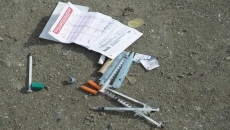Health Canada has authorized the use of a fifth COVID-19 vaccine to add to its arsenal and perhaps lead to an uptick in vaccinations among people who remain hesitant.
The Nuvaxovid vaccine, which is protein-based, is the first of its kind to get approval in the country.
Prime Minister Justin Trudeau acknowledge approval of the vaccine over social media.
Update: @GovCanHealth has approved Novavax’s COVID-19 vaccine. This is the fifth COVID-19 vaccine approved for use in Canada – it’s safe, it’s effective, and it’s another positive step forward in our fight against this virus. If you haven’t yet gotten vaccinated, now’s the time.
— Justin Trudeau (@JustinTrudeau) February 17, 2022
"It can help remove barriers to vaccination by providing an additional option to adults who have not yet received a COVID-19 vaccine," Dr. Theresa Tam, Canada’s chief public health officer, said Thursday.
5/5 As well, having an additional authorized vaccine in Canada, can help remove barriers to vaccination for adults who have not yet received a COVID-19 vaccine. #VaccinesWork
— Dr. Theresa Tam (@CPHO_Canada) February 17, 2022
Infectious disease doctors say the non-mRNA vaccine could win over a few more people who have hesitated to get immunized against COVID-19.
Two of the vaccines already available use genetically engineered messenger RNA, which instructs cells to start fighting the virus. It never enters a person's DNA, but some have voiced fears that it could do that and mutate.
More than 84 per cent of Canadians who are eligible are fully vaccinated. Tam said Nuvaxovid, developed by the U.S. company Novavax Inc., could play an important role in closing the gap.
"It is not too late to get your first, second or booster dose," Tam said.
Nuvaxovid is approved for adults. It is administered in two doses, 21 days apart.
Dr. Supriya Sharma, chief medical adviser with Health Canada, said the vaccine contains small pieces of viral proteins that have been selected for their ability to trigger immunity. The approach is already used in vaccines for diseases, including hepatitis B, and for influenza.
Sharma said clinical trials foundNuvaxovid was 90 per cent effective at preventing symptomatic COVID-19 and 100 per cent effective at preventing severe disease.
Additionally, Health Canada said that preliminary data shows Nuvaxovidproduces neutralizing antibodies against the Omicron variant that fuelled the pandemic's fifth wave.
The vaccine has already been cleared for use in Europe, Australia and Singapore. Doses are to start being distributed in Canada in March.
Ottawa signed a deal last year to produce Novavax's vaccine in Canada and a manufacturing plant was constructed in Montreal.
The first doses will not be manufactured in Canada. Sharma said the Montreal plant has not yet been authorized to produce the vaccine and has not indicated to Health Canada that it is prepared for an inspection.
Hospitalizations continue to slowly decline across the country and many provinces are moving to lift more public health orders.
"We do think the highest risk is behind us, that we are heading into a lower-risk environment," said Dr. Kieran Moore, Ontario's chief medical officer of health.
Ontario's COVID-19 hospitalizations dropped by 61 to 1,342 Thursday, the same day capacity limits further eased. Restaurants, gyms and other indoor spaces that require proof of vaccination are no longer required to limit capacity. The exception is sports arenas and theatres which can open at half capacity.
Moore also said that immunization policies — such as those that require people to be vaccinated or regularly tested to continue working — could be removed as early as March 1.
"Their purpose was to improve immunization and protect Ontarians. They’ve done that."
Moore said 90 per cent of eligible Ontarians 12 and older have had two vaccine shots and the province will look at removing mask mandates in the second or third week of March.
Quebec also saw a continued decline of hospitalizations a day after that province relaxed restrictions in seniors residences. There were 1,902 in hospital due to COVID-19, a decrease of 93 from Wednesday.
Quebec no longer requires people who live in seniors residences and long-term care homes to isolate for 10 days if another resident or a worker on their floor tests positive for COVID-19.
Health officials say 91 per cent of Quebec residents five and older have received at least one dose of vaccine and 50 per cent have received three.
Earlier Thursday, Yukon Premier Sandy Silver announced some public health restrictions in the territory would be eased.
Capacity limits for gatherings, businesses and faith gatherings will be loosened but Silver said proof of vaccination will still be required.
He said the Omicron variant has peaked in the territory and is "trending towards safer waters." Silver added he hopes to lift all but a few restrictions by March.
"We will continue to monitor the situation over the coming weeks and hopefully we'll be in a position to continue to loosen public health measures if we stay on this track," Silver said.






